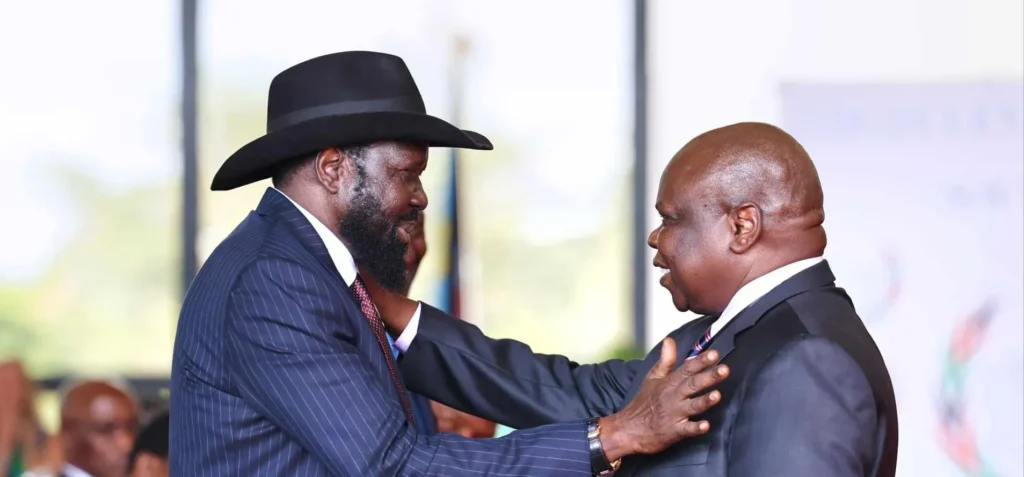A confidential draft agreement obtained by Radio Tamazuj outlines the formation of a new transitional government in South Sudan as a result of the Nairobi peace talks.
The 25-page leaked document details an inclusive governance structure and responsibility sharing among the government, opposition groups, and other stakeholders, covering areas such as executive roles, legislature, security, constitutional processes, and elections management.
The opposition groups are a faction of South Sudan Opposition Movements Alliance (SSOMA) of Gen. Paul Malong and Pagan Amum, South Sudan United National Alliance (SSUNA) led by Gen. Stephen Buoy Rolnyang, and National Salvation Front-Revolutionary Command led by Gen. Mario Loku Thomas.
Other stakeholders are civil society, academia and faith-based groups.
Other governance and responsibility-sharing areas agreed on include justice sector reforms, ceasefires, security arrangements, and reforms. The document talks of the reconstitution of the Strategic Defence and Security Review (SDSR) Board, which shall consist of the representatives of the armed opposition groups, to formulate and implement a comprehensive security sector reform that provides for creating a unified army and reconstituting the other organized forces.
The parties and stakeholders reiterated their commitment to transparent and accountable management of resources and agreed to manage all revenues and public resources effectively.
In the constitution-making process, the document says the parties agreed to revitalize, structure, and reconstitute the National Constitutional Review Commission (NCRC) to expand membership and provide an all-inclusive Commission. They also agreed on enhancing inclusivity in the structures and processes of the constitution-making.
The agreement mandates the NCRC to organize and facilitate a National Constitutional Conference, which will be held in South Sudan, and that the conference will be preceded by mini consultative conferences in the region and diaspora, which Tumaini Initiative and other partners shall facilitate.
“Mini consultative conferences will provide South Sudanese living outside the country the opportunity to participate in the Permanent Constitution Making process,” the document says.
Leadership Council
The parties and stakeholders agreed to establish a National Leadership Council (NLC) that shall be the national guarantor of the implementation of the Tumaini Framework.
According to the document, the Council shall comprise of the president, the first vice president, four vice presidents, one representative of RTGoNU, and one representative of opposition groups signatories to the Tumaini Initiative.
The document says the role of the NLC is to provide leadership and guidance to the Joint Defense Board, the NCRC, the National Elections Commission, the Political Parties Council and other agencies whose mandate is relevant to the implementation of the Tumaini Framework.
“The decision of the NLC shall be final and not subject to approval by the Cabinet or Legislature. The decision making in the NLC shall be by consensus and instead of that, by two thirds (2/3rd) majority,” it stated.
Confidence-Building
The parties and stakeholders agreed to form a Regional High-Level Panel of Heads of State and Government, which shall be composed of heads of state and government from the region and whose responsibilities and roles shall be to monitor and oversee the agreement in liaison with the National Leadership Council.
The draft document states that the Tumaini Framework supersedes all previous agreements with regard to implementation plans, structures, and processes in so far as they do not align with the roadmap set out in this framework.
According to the document, the transitional period will ensure the conclusion of the national census, boundary delimitation, voter education and registration, finalization of the constitution and elections.
The parties and stakeholders, the document said, agreed to release the political prisoners and detainees after the signing of the peace agreement and that the government shall fully take measures to guarantee the freedom of movement of political leaders in and outside of South Sudan.
“The government shall take immediate and appreciative measures to fully guarantee, without exception, the freedom of expression and all persons in South Sudan, including freedom of the media and access to information according to the law,” it said.
It added, “Parties and stakeholders in the Tumaini Initiative shall make a confidence-building visit to Juba, South Sudan and hold a joint public forum to jointly declare, publicize and commit to the roadmap for implementation of the framework.”
Key institutions
The parties and stakeholders, according to the document, commit to enhancing measures aimed at reforming the justice system including to prioritize establishment of the Commission for Truth, Reconciliation and Healing, prioritize the establishment of the Compensation and Reparation Authority (CRA).
Other institutions to be stablished include the Hybrid Court of South Sudan (HCSS) and the implementation of the judicial reforms outlined in the 2018 peace agreement.
On Thursday, South Sudan’s first vice president said that peace talks in Kenya have failed to acknowledge the country’s peace agreement established in 2018, alleging a new draft agreement is aimed at replacing the original peace deal.
Riek Machar in a protest letter to the chief mediator said the draft established alternative institutions to replace or run in parallel with those established by the previous peace agreement. He added that the current peace talks should complement and not obliterate the original deal.
The former rebel leader signed an agreement with President Salva Kiir in 2018 that ended a five-year civil war that killed about 400,000 people. Machar and Kiir were on opposite sides in the war and Machar was appointed first vice president after the 2018 deal. His representatives are now part of the transitional government’s delegation in the current talks.




